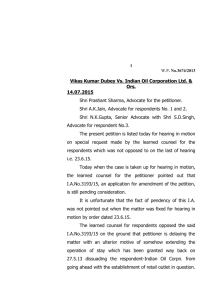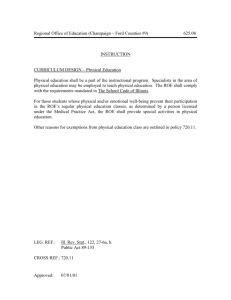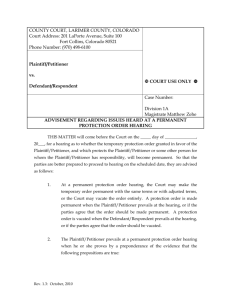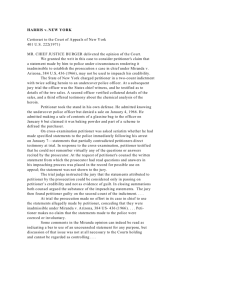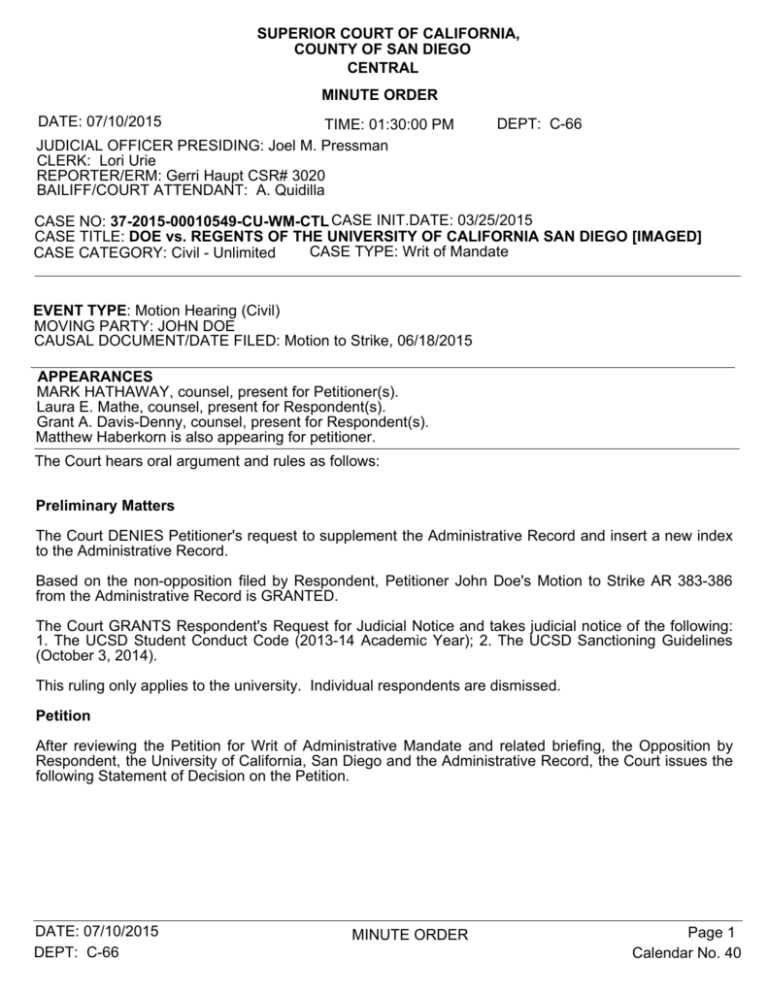
SUPERIOR COURT OF CALIFORNIA,
COUNTY OF SAN DIEGO
CENTRAL
MINUTE ORDER
DATE: 07/10/2015
TIME: 01:30:00 PM
JUDICIAL OFFICER PRESIDING: Joel M. Pressman
CLERK: Lori Urie
REPORTER/ERM: Gerri Haupt CSR# 3020
BAILIFF/COURT ATTENDANT: A. Quidilla
DEPT: C-66
CASE NO: 37-2015-00010549-CU-WM-CTL CASE INIT.DATE: 03/25/2015
CASE TITLE: DOE vs. REGENTS OF THE UNIVERSITY OF CALIFORNIA SAN DIEGO [IMAGED]
CASE TYPE: Writ of Mandate
CASE CATEGORY: Civil - Unlimited
EVENT TYPE: Motion Hearing (Civil)
MOVING PARTY: JOHN DOE
CAUSAL DOCUMENT/DATE FILED: Motion to Strike, 06/18/2015
APPEARANCES
MARK HATHAWAY, counsel, present for Petitioner(s).
Laura E. Mathe, counsel, present for Respondent(s).
Grant A. Davis-Denny, counsel, present for Respondent(s).
Matthew Haberkorn is also appearing for petitioner.
The Court hears oral argument and rules as follows:
Preliminary Matters
The Court DENIES Petitioner's request to supplement the Administrative Record and insert a new index
to the Administrative Record.
Based on the non-opposition filed by Respondent, Petitioner John Doe's Motion to Strike AR 383-386
from the Administrative Record is GRANTED.
The Court GRANTS Respondent's Request for Judicial Notice and takes judicial notice of the following:
1. The UCSD Student Conduct Code (2013-14 Academic Year); 2. The UCSD Sanctioning Guidelines
(October 3, 2014).
This ruling only applies to the university. Individual respondents are dismissed.
Petition
After reviewing the Petition for Writ of Administrative Mandate and related briefing, the Opposition by
Respondent, the University of California, San Diego and the Administrative Record, the Court issues the
following Statement of Decision on the Petition.
DATE: 07/10/2015
DEPT: C-66
MINUTE ORDER
Page 1
Calendar No. 40
CASE TITLE: DOE vs. REGENTS OF THE
UNIVERSITY OF CALIFORNIA SAN DIEGO [IMAGED]
CASE NO: 37-2015-00010549-CU-WM-CTL
Review under California Code of Civil Procedure Section 1094.5
Pursuant to Cal. Civ. Proc. Code § 1094.5(b), the inquiry for the Court is whether the respondent has
proceeded without, or in excess of jurisdiction; whether there was a fair trial; and whether there was any
prejudicial abuse of discretion. Abuse of discretion is established if the respondent has not proceeded in
a manner required by law, the order or decision is not supported by the findings, or the findings are not
supported by the evidence.
Whether there was a Fair Trial
While the Court respects the university's determination to address sexual abuse and violence on its
campus, after reviewing the Administrative Record, the Court finds that in this particularly case, the
hearing against petitioner was unfair.
In this particular case, the Court is concerned about petitioner's due process right to confront and
cross-examine adverse witnesses. In almost every proceeding "where important decisions turn on
questions of fact, due process requires an opportunity to confront and cross-examine adverse
witnesses." Goldberg v. Kelly (1970) 397 U.S. 254, 269. People involved in an administrative
proceeding have a right to cross-examine witnesses, this right "is considered as fundamental an element
of due process as it is in court trials." McLeod v. Board of Pension Commissioners (1970) 14 Cal.
App.3d 23, 28. "An improper denial of the right of cross-examination constitutes a denial of due
process." Priestly v. Superior Court (1958) 50 Cal.2d 812, 822
The right of cross-examination is especially important where findings against a party are based on an
adverse witness's testimony. Manufactured Home Communities, Inc. v. Cnty. of San Luis Obispo (2008)
167 Cal. App. 4th 705, 711-12. Here, cross-examination was essential. The Student Conduct Review
Report made findings regarding the credibility of Ms. Roe and the outcome turned on her testimony.
The university unfairly limited petitioner's right to cross-examine the primary witness against him, Ms.
Roe. Based upon the Administrative Record, Petitioner followed its guidelines (The Hearing Procedures
for Alleged Sex Offense, Harassment or Discrimination), which provides in Section III Subparagraph P
for the parties to provide questions to the Hearing Panel Chair "to be asked of the other party or
witnesses at the Chair's [...] discretion." (Exhibit 14, 1:21-26.) However, as conceded in the First
Finding in the Student Conduct Review Report, only nine of Petitioner's thirty-two questions were
actually asked by the Panel Chair.
The Court determines that it is unfair to Petitioner that his questions were reviewed by the Panel Chair
for her alone to determine whether or not the question would be asked and then answered by the
witness. While the Court understands the need to prevent additional trauma to potential victims of
sexual abuse, this can be achieved in a less restrictive manner. The limiting of the questions in this case
curtailed the right of confrontration crucial to any definition of a fair hearing.
In this particular case, the prejudice to the petitioner in the failure to ask the questions is evident. For
example, Ms. Otten, the Panel Chair, refused to ask questions 13 through 19, which concerned Ms.
Roe's text messages to Mr. Doe. The chair paraphrased questions 20 and 22 (AR 307:17-25; 308:1-21;
308:22-24.) ) These questions were significant because they were germane to Ms. Roe and Mr. Doe's
relationship after February 1, 2014, which petitioner had denied. (AR 277; AR 309-310)
DATE: 07/10/2015
DEPT: C-66
MINUTE ORDER
Page 2
Calendar No. 40
CASE TITLE: DOE vs. REGENTS OF THE
CASE NO: 37-2015-00010549-CU-WM-CTL
UNIVERSITY OF CALIFORNIA SAN DIEGO [IMAGED]
In restricting petitioner's right to ask questions, Ms. Otten allowed restricted answers and prevented any
follow-up that may have been necessary for petitioner to make his defense. For example, when Ms.
Otten asked question 22 regarding the relationship after the alleged event, Ms. Otten blatantly permitted
Ms. Roe to state that she (Ms. Roe) could not see how her relationship with Mr. Doe after the incident
was relevant, and Ms. Roe did not provide a responsive answer. (AR 310:10-14.) Ms. Otten also
permitted Ms. Roe to give an incomplete answer to question 10.
The Court also notes that Ms. Roe was placed behind a barrier during the proceedings. The Court
recognizes it is disputed as to whether Ms. Roe was visible to the panel. According to the University,
Ms. Roe was visible to the panel during the proceedings, but it is unclear as to whether Ms. Roe was
visible to Petitioner throughout the proceedings. There is no indication that Petitioner was hostile
towards Ms. Roe since their encounter on May 14, 2014, and Petitioner has a right to confront adverse
witnesses. The Court does not see the necessity of the screen between Ms. Roe and Petitioner. The
Court also notes the importance demeanor and non-verbal communication in order to properly evaluate
credibility. This is especially true given that the panel made findings in this case from Ms. Roe's
testimony and her credibility.
The hearing also limited petitioner's right of confrontation in what evidence was left out of the hearing.
The only witness at the hearing was Ms. Roe. Mr. Jabukisin then mentions the OPHD's report and
quotes Ms. Dalcourt's investigative report in his closing argument. (Exhibit 15, 37:23-25; 38:1-3.) While
the OPHD report is included in the administrative record, the transcript of the administrative hearing
does not mention the OPHD's investigative report until Mr. Jabukisin's closing remarks. The Panel then
relies on the OPHD report when making its findings. First, the Panel cites the report in Finding 3 for the
proposition that Ms. Elena Dalcourt stated that John entered Jane's vagina with his fingers a total of
three times. Further, the panel relied upon Ms. Dalcourt's finding of substantial evidence to support the
charges: "Ms. Elena Dalcourt at the UCSD Office for the Prevention of Harassment & Discrimination
(OPDH) conducted an investigation of this incident and found 'based upon the totality of the
circumstances and the evidence presented, I find it more likely than not that on February 1, Mr. Doe
ignored Ms. Roe's objections to sexual activity in violation of the Student Sex Offense Policy.'" (Exhibit
17 p. 2, Finding 6.)
This is all problematic for a number of reasons. First, the Panel relied on evidence that was outside the
hearing. Ms. Dalcourt did not testify. While the technical rule of hearsay is not applicable to the hearing,
the hearing did not allow petitioner any opportunity to refute Ms. Dalcourt's findings. Ms. Dalcourt's
conclusions were crucial to the findings, but petitioner was denied his right of confrontation. Second, the
right of confrontation was compounded because petitioner was not given any of the underlying 14
witnesses interviewed by Officer Dalcourt nor was petitioner provided with Ms. Roe's interview
statements on June 12 and July 29. By doing so, the hearing deprived petitioner the opportunity to
examine anything about the summary conclusions relied upon by the hearing panel. At no time is
Petitioner given the opportunity to confront the OPHD report or Ms. Dalcourt because she was not
present at the hearing.
Third, Finding No. 6 improperly delegates the panel's duty to an outside witness that was not present at
the hearing. The panel stated that Ms. Dalcourt conducted an investigation and concluded that it was
more likely than not that petitioner violated the policy. However, it was the panel's responsibility to
determine whether it was more likely than not that petitioner violated the policy and not defer to an
investigator who was not even present to testify at the hearing. "Due process requires that a hearing . . .
'be a real one, not a sham or a pretense." Ciechon v. City of Chicago (7th Cir. 1982) 686 F.2d 511, 517.
DATE: 07/10/2015
DEPT: C-66
MINUTE ORDER
Page 3
Calendar No. 40
CASE TITLE: DOE vs. REGENTS OF THE
CASE NO: 37-2015-00010549-CU-WM-CTL
UNIVERSITY OF CALIFORNIA SAN DIEGO [IMAGED]
The curtailment of petitioner's right to confrontation is also evident in the questioning completed by Mr.
Jabukisin, the university representative. When Petitioner wanted to object or remove a statement made
by Ms. Roe, he was denied by the Panel Chair. (Exhibit 15, 26:5-8.) Additionally, Mr. Jabukisin's
questions to Ms. Roe did not appear to be reviewed by the Panel Chair at any time during the hearing,
unlike Petitioner's questions. Both of these actions are prejudicial to Petitioner by limiting his ability to
participate in the hearing while allowing full participation by the university representative.
In addition to the curtailment of the basic right of confrontation, it appears that the panel gave improper
weight to petitioner's exercise of his 5th Amendment Right of Privilege Against Self Incrimination. A
basic principle of fairness is that a trier of fact may not draw any inference from a witness's invocation of
a privilege.  People v. Doolin (2009) 45 Cal.4th 390. The Panel's findings state: "While John
stated during the hearing that he did not digitally penetrate Jane's vagina, he abstained from providing
additional information regarding the incident and what occurred around the time of the incident and the
panel would have liked to hear more information from him." (Exhibit 17 p. 2, Finding 4 emphasis added.)
This finding indicates weight given to John's assertion of the 5th Amendment privilege.
Based on the above, the Court finds that hearing was unfair to petitioner. The Court further proceeds to
determine whether the findings articulated by the panel supports the conclusion and whether the
evidence supports the findings.
Decision
John Doe was found to violate university policy regarding sexual misconduct as defined in Section VII,
Letter AA: "Sexual misconduct" means non-consensual sexual activity engaged in without the intent to
hurt another, such as when a person believes unreasonably that effective consent was given when, in
fact, it was not." (AR 621)
Findings
While there is a series of conduct discussed in the Student Conduct Review Report and at the hearing,
the Report limits the allegations to the following: "Specifically, [Petitioner] was alleged to have ignored
Ms. Roe's objections to sexual activity on the morning of February 1, 2014, in violation of the Student
Sex Offense Policy." There are seven findings in the Student Conduct Review Report.
While the findings are flawed, they generally support the conclusion reached. The problem is whether
the findings are supported by the evidence.
Whether the Findings are Supported by the Evidence
Under subdivision Cal. Civ. Proc. Code § 1094.5(c), "Where it is claimed that the findings are not
supported by the evidence, in cases in which the court is authorized by law to exercise its independent
judgment on the evidence, abuse of discretion is established if the court determines that the findings are
not supported by the weight of the evidence. In all other cases, abuse of discretion is established if the
court determines that the findings are not supported by substantial evidence in the light of the whole
record."
The parties agree in this case on the standard of the court when evaluating the evidence to support the
findings. "Where a 'statewide agency is delegated quasi-judicial power by the Constitution, the
reviewing court is limited to determining whether there was substantial evidence supporting the agency's
DATE: 07/10/2015
DEPT: C-66
MINUTE ORDER
Page 4
Calendar No. 40
CASE TITLE: DOE vs. REGENTS OF THE
CASE NO: 37-2015-00010549-CU-WM-CTL
UNIVERSITY OF CALIFORNIA SAN DIEGO [IMAGED]
decision.' 'Substantial evidence has been
defined as 'relevant evidence that a reasonable mind might accept as adequate to
support a conclusion.'" Apte v. Regents of Univ. of Cal. (1988) 198 Cal.App.3d
1084, 1091.
The reviewing court must uphold the decision and may not reweigh evidence where the inferences
drawn from the administrative body are plausible. Halaco Engineering Co. v. South Central Coast
Regional Com. (1986) 42 Cal.3d 52, 74. The substantial evidence standard forbids the court from
substituting its judgment in place of the reviewing board. Regents of University of California v. Public
Employment Relations Bd. (1986) 41 Cal.3d 601, 617. Where conflicting inferences can be adduced
from the evidence, the court accepts all reasonable inferences supporting the administrative finding.
Neilson v. City of California City (2007) 146 Cal.App.4th 633, 641.
The Court finds that substantial evidence does not support the finding of non-consensual sexual activity.
First, as stated above, crucial findings number 3 and 6 were based upon Officer Dalcourt's investigation
summary that was not presented at the hearing in any meaningful way. Given the fundamental
unfairness of relying on this report without a meaningful opportunity for petitioner to challenge its
contents, the Court has no choice but to exclude the report from consideration in evaluating whether
substantial evidence exists to support the conclusion.
At the hearing on December 12, 2014, petitioner testified clearly that the allegation of
touching on February 1, 2014 was false and did not occur. The only evidence presented in any
meaningful way at the hearing was the testimony of Ms. Roe. Ms. Roe stated that petitioner kept "trying
to finger [her] and touch [her] down there." Also, Ms. Roe did not object to sexual contact per se, and
only explained that it was not pleasurable for her at that time. (AR 298)
Additionally, Ms. Roe admitted that she voluntarily continued consensual sexual activity with Mr. Doe
later that very same day. The Court is not weighing Ms. Roe's credibility. But the incident on the
morning of February 1, cannot be viewed in a vacuum. When viewed as part of the entire narrative, the
sequence of events do not demonstrate non-consensual behavior. What the evidence does show is Ms.
Roe's personal regret for engaging in sexual activity beyond her boundaries. (See AR 20-21) The
panel's finding in paragraph 3 illustrates the lack of evidence: "Jane stated that she physically wanted to
have sex with Ryan but mentally wouldn't." The record reflects this ambivalence on the part of Ms. Roe.
But Ms. Roe's own mental reservations alone cannot be imputed to petitioner, particularly if she is
indicating physically she wants to have sex.
Penalty
Finally, there is unfairness related to the penalty. "The penalty imposed by an administrative body will
not be disturbed in mandamus proceedings unless an abuse of discretion is demonstrated." Landau v.
Superior Court ( 1998) 81 Cal.App.4th 191, 218. And a reviewing court cannot "substitute its discretion
for that of the administrative agency concerning the degree of punishment imposed." (Ibid.)
As to the sanctions in this case, the Court finds the university abused its discretion in increasing
sanctions after appeal without explanation. Petitioner's initial sanctions were the following: "(1)
suspension for one quarter, (2) permanent no contact order, due to the potential for ongoing harm to the
complaining witness, (3) a two hour sex offense/sexual harassment training with OPHD, and (4)
counseling assessment with CAPS." (Exhibit 17 p. 2 Section D. "Sanctions.") When Petitioner appealed
the decision of the Panel, Dean Mallory increased Petitioner's suspension time to one year, which would
DATE: 07/10/2015
DEPT: C-66
MINUTE ORDER
Page 5
Calendar No. 40
CASE TITLE: DOE vs. REGENTS OF THE
CASE NO: 37-2015-00010549-CU-WM-CTL
UNIVERSITY OF CALIFORNIA SAN DIEGO [IMAGED]
cause Petitioner to reapply to the University to be readmitted, placed Petitioner on non-academic
probation, required Petitioner to attend ethics workshops, all in addition to the original sanctions given.
(Exhibit 19.) Nowhere in Dean Mallory's email to Petitioner does she indicate the reasoning behind the
increased sanctions. Petitioner then appealed to the Council of Provosts, who affirmed the decision
made by Dean Mallory and the Panel. The Council of Provosts also increased Petitioner's suspension
time to one year and a quarter, allowing Petitioner to return to the University in the Spring of 2016.
(Exhibit 27.) The Council of Provosts also did not provide any reasoning behind the increased
sanctions. Given the lack of rationale by both Dean Mallory and the Council of Provosts for the
increased sanctions, it appears the increased sanctions are punitive towards Petitioner for appealing the
decision of the Panel.
Order
The Court finds that the hearing was unfair and that evidence did not support the findings. The Court
GRANTS the Petition for Writ of Mandamus and orders Respondent to set aside its findings and
sanctions issued against petitioner.
Judge Joel M. Pressman
DATE: 07/10/2015
DEPT: C-66
MINUTE ORDER
Page 6
Calendar No. 40



